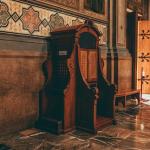Von Balthasar says somewhere that beauty makes demands, and suggests that this is a natural analogy to the attitude of faith, which is like an aesthetic response to the form of Christ. Beauty makes demands. If I hear the central movement of Beethoven’s Appassionata or any of a dozen other pieces of music, I can’t do anything else. I’ve got to listen. Try not breathing deeply when you catch a whiff of hyacinth. Try not looking at a beautiful landscape,... Read more


















